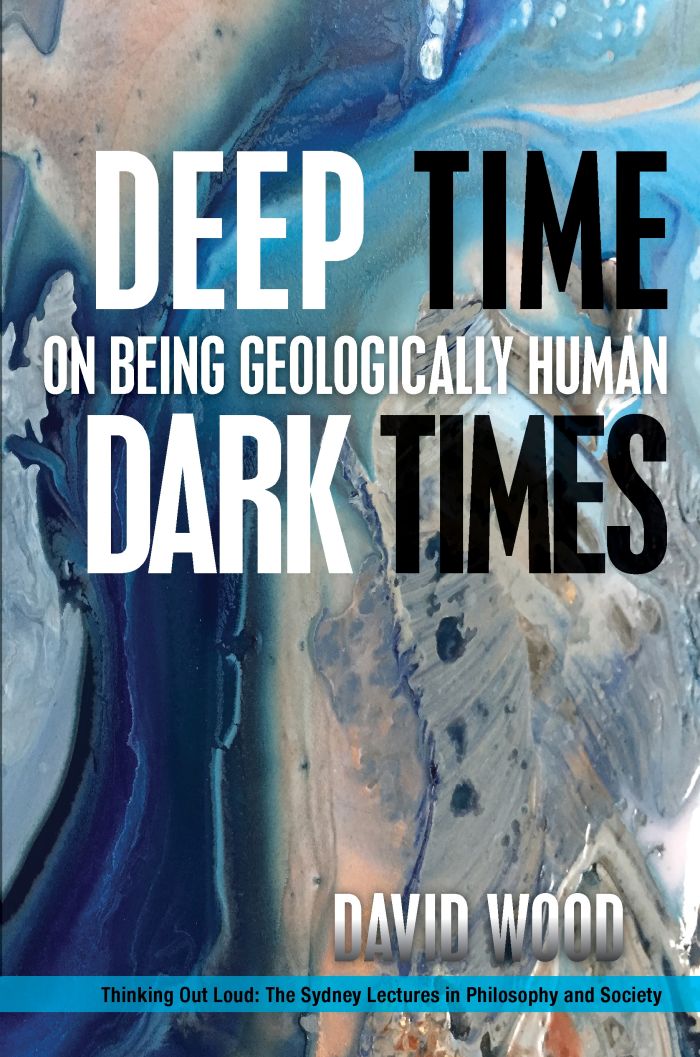Deep Time, Dark Times
On Being Geologically Human

This book can be opened with

The new geological epoch we call the Anthropocene is not just a scientific classification. It marks a radical transformation in the background conditions of life on Earth, one taken for granted by much of who we are and what we hope for. Never before has a species possessed both a geological-scale grasp of the history of the Earth and a sober understanding of its own likely fate. Our situation forces us to confront questions both philosophical and of real practical urgency. We need to rethink who “we” are, what agency means today, how to deal with the passions stirred by our circumstances, whether our manner of dwelling on Earth is open to change, and, ultimately, “What is to be done?” Our future, that of our species, and of all the fellow travelers on the planet depend on it.
The real-world consequences of climate change bring new significance to some very traditional philosophical questions about reason, agency, responsibility, community, and man’s place in nature. The focus is shifting from imagining and promoting the “good life” to the survival of the species. Deep Time, Dark Times challenges us to reimagine ourselves as a species, taking on a geological consciousness. Drawing promiscuously on the work of Nietzsche, Heidegger, Foucault, Derrida, Deleuze, and other contemporary French thinkers, as well as the science of climate change, David Wood reflects on the historical series of displacements and de-centerings of both the privilege of the Earth, and of the human, from Copernicus through Darwin and Freud to the declaration of the age of the Anthropocene. He argues for the need to develop a new temporal phronesis and to radically rethink who “we” are in respect to solidarity with other humans, and responsibility for the nonhuman stakeholders with which we share the planet. In these brief, lively chapters, Wood poses a range of questions centered on our individual and collective political agency. Might not human exceptionalism be reborn as a sort of hyperbolic responsibility rather than privilege?
A timely and transformative challenge to confront our responsibilities in the face of climate disaster and the Anthropocene, Deep Time, Dark Times draws insights from Nietzsche, Heidegger, and Derrida to inform our emerging geological consciousness. Playful while serious, sophisticated yet disarmingly genuine, Wood leads us through the conceptual brambles of our planetary plight and raises the stakes for what it means to think philosophically in our time. His lessons on thinking and living geohistorically will be essential reading for environmental humanists, philosophers, and anyone interested in avoiding the worst of our possible futures.—Ted Toadvine, University of Oregon
David Wood's Deep Time, Dark Times is a brief, speculative overview of what philosophy contributes to the pressing need to reimagine our "matter of dwelling" in the face of climate catastrophe. For Wood, the sobering predictions of climate science force on us a new vision of who and what we are, the moral imperative that "we cannot go on like this", changing our conceptions of time, reality, agency, humanity and life in general.—Environmental Values
...This is important and necessary work that scholars engage in, work that contributes to the growth and evolution of our disciplines. And this is what Wood has contributed to the great conversation of philosophical discourse, which may or tragically may not survive the Anthropocene and the looming catastrophe that we have brought upon ourselves.—Kronoscope
Author Blog
1. Herding the Cats of Deep Time 1
2. Who Do We Think We Are? 26
3. Cosmic Passions 36
4. Thinking Geologically after Nietzsche 47
5. Angst and Attunement 60
6. The Present Age: A Case Study 73
7. Posthumanist Responsibility 82
8. The New Materialism 96
9. The Unthinkable and the Impossible 107
10. What Is to Be Done? Democracy and Beyond 121
Acknowledgments 137
Notes 139
Index 157





